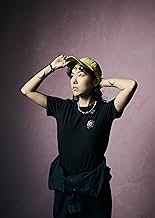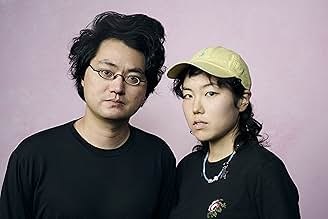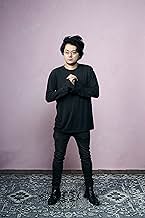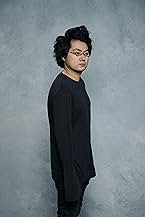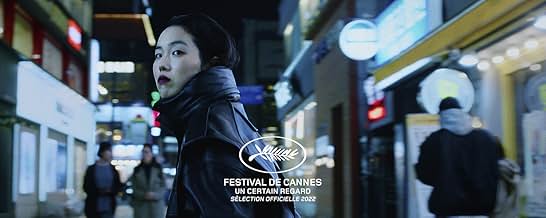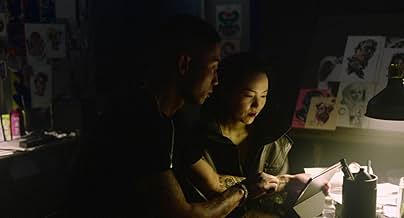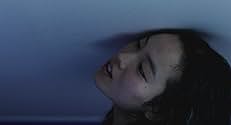Retour à Séoul
- 2022
- Tous publics
- 1h 59m
IMDb RATING
6.9/10
10K
YOUR RATING
A twenty-five-year-old French woman returns to Korea, the country she was born in before being adopted by a French couple, for the very first time. She decides to track down her biological p... Read allA twenty-five-year-old French woman returns to Korea, the country she was born in before being adopted by a French couple, for the very first time. She decides to track down her biological parents, but her journey takes a surprising turn.A twenty-five-year-old French woman returns to Korea, the country she was born in before being adopted by a French couple, for the very first time. She decides to track down her biological parents, but her journey takes a surprising turn.
- Awards
- 10 wins & 25 nominations total
Heo Jin
- Grandmother
- (as Jin Heo)
Régine Vial
- Gisèle Benoît
- (as Régine Vial Goldberg)
Shin Dong-ho
- Tena's Father
- (as Dong-ho Shin)
Featured reviews
Return to Seoul is a captivating film that presents an intimate and complex portrayal of Freddie, although the larger context of her life is missing. However, the film's commitment to staying in the moment keeps the audience engaged. While the film does not have a strong emotional impact, it remains focused on Freddie's search for her identity and origins. Nevertheless, the movie lacks originality and does not distinguish itself from other films with similar themes. Despite this, Return to Seoul is still a well-made film that provides a compelling character portrait, albeit with some rambling sequences that do not add much to the story.
I saw this film yesterday and I thought that it's an original and unique film, but somewhat difficult to enjoy. An issue that many people have is that they can't connect to Freddy, the main character, and I get why. Her behaviour is often erratic, and then at times repelling and harsh to others. As she really takes centre stage in this film, it can be hard even for the spectator to put up with her behaviour, even though it is nowhere near outright evil. I thought a bit more about this, and will share my view of it. I won't reveal any detail of the film that you can't find in any generic introduction, so no spoilers, however if you want to watch this and build your own understanding unaffected by my interpretation, you may not want to read on.
I actually know well a person in a similar situation to Freddy, somebody from outside Europe who was adopted to Europe at the age of half a year. There are clear parallels also in behaviour. Being abandoned is a primal experience for adopted children. In these cases an additional thing is that the environment can clearly see that the parents are not the biological parents, and some may think the child "doesn't belong" in the country to where it was adopted. This will add to their experience of being somewhat odd and maybe not really accepted, even though the adoptive parents themselves may not convey anything of that kind. What I see in Freddy is a very strong tendency to keep up and defend her own independence fiercely, particularly if somebody else gets closer. The biological parents have given her away, so it is hard to handle and accept for her if she meets them again and they want some closer contact. I think there is much fear of being abandoned again involved. She may also have tried extra hard to become a proper French person when growing up, potentially facing some prejudice but also encouragement there, and she may identify South Korea as a place that abandoned her, even though there is also curiosity and a certain feeling of connection that she has difficulties allowing for herself. So she develops this rather ambivalent relationship to South Korea and the people there, sometimes behaving extra strange, sometimes getting closer, then again wanting to run away when indeed somebody gets a bit closer. There may also be an element of trying to prove life wrong, trying to show to herself that ultimately she isn't rejected by South Korea and her biological parents, but with a lot of suspicion and self protection at the same time. So thinking about this a bit longer, ultimately her behaviour makes a lot of sense to me, even in its superficial inconsistency.
So after a day I think this is actually very well done and convincing, and I'll give it 8 stars, even though I hadn't felt like that yesterday when the film ended. Note, explanations are not normally given in the film. She does what she does but she really isn't communicative about her motives, so we can only speculate. But it makes all sense to me, given also my personal knowledge of such a person.
I actually know well a person in a similar situation to Freddy, somebody from outside Europe who was adopted to Europe at the age of half a year. There are clear parallels also in behaviour. Being abandoned is a primal experience for adopted children. In these cases an additional thing is that the environment can clearly see that the parents are not the biological parents, and some may think the child "doesn't belong" in the country to where it was adopted. This will add to their experience of being somewhat odd and maybe not really accepted, even though the adoptive parents themselves may not convey anything of that kind. What I see in Freddy is a very strong tendency to keep up and defend her own independence fiercely, particularly if somebody else gets closer. The biological parents have given her away, so it is hard to handle and accept for her if she meets them again and they want some closer contact. I think there is much fear of being abandoned again involved. She may also have tried extra hard to become a proper French person when growing up, potentially facing some prejudice but also encouragement there, and she may identify South Korea as a place that abandoned her, even though there is also curiosity and a certain feeling of connection that she has difficulties allowing for herself. So she develops this rather ambivalent relationship to South Korea and the people there, sometimes behaving extra strange, sometimes getting closer, then again wanting to run away when indeed somebody gets a bit closer. There may also be an element of trying to prove life wrong, trying to show to herself that ultimately she isn't rejected by South Korea and her biological parents, but with a lot of suspicion and self protection at the same time. So thinking about this a bit longer, ultimately her behaviour makes a lot of sense to me, even in its superficial inconsistency.
So after a day I think this is actually very well done and convincing, and I'll give it 8 stars, even though I hadn't felt like that yesterday when the film ended. Note, explanations are not normally given in the film. She does what she does but she really isn't communicative about her motives, so we can only speculate. But it makes all sense to me, given also my personal knowledge of such a person.
I could not watch this film without any expectation or prejudice, as I know someone who has a sibling that is an adopted Korean child. However I still tried to keep an open mind, and I think the film is executed well.
Freddie is the only character that is really fleshed out and I think that's right. There are several other characters, notably Freddie's father, that are treated with respect by the film but they are not given a lot of depth. But since it's not their story that is being told they all have to take a back seat to the little girl that it's all about.
After watching this I did a little digging and I found that adoption, foreign or not, is culturally, politically and therefore historically laden in South Korea. You have to want to go looking for it as the film does not push the subject too heavily, but it certainly has several scenes referring to this subject from the institutional rather than the personal viewpoint.
I do think the film has some problems in finding the right tone and there are segments that do not help progress the story. The whole birthday party segment might be nicely shot but does not really add anything.
All in all it's a good film and it triggered me to learning a bit more about its subject matter.
Freddie is the only character that is really fleshed out and I think that's right. There are several other characters, notably Freddie's father, that are treated with respect by the film but they are not given a lot of depth. But since it's not their story that is being told they all have to take a back seat to the little girl that it's all about.
After watching this I did a little digging and I found that adoption, foreign or not, is culturally, politically and therefore historically laden in South Korea. You have to want to go looking for it as the film does not push the subject too heavily, but it certainly has several scenes referring to this subject from the institutional rather than the personal viewpoint.
I do think the film has some problems in finding the right tone and there are segments that do not help progress the story. The whole birthday party segment might be nicely shot but does not really add anything.
All in all it's a good film and it triggered me to learning a bit more about its subject matter.
Inspired by the life of Laure Badufle, the screen-writer, "Return To Seoul" takes us on a journey of regret, anger, sorrow and wondering what could have been. This film puts an exciting spin on the "adoptee wants to find their biological parents" genre with its depiction of all of the stages Freddie, the protagonist, goes through on her journey of reconciling with her biological parents and also finding her own identity. Davy Chou, the director, captures incredibly Freddie's stance on reuniting with her father, which shows that she is torn between wanting to meet him and being angry with him for giving her up in the first place - this ambivalence keeps the whole narrative thrilling in an otherwise slow pace/slow burn picture like this. What I must appreciate is the truly realistic approach to the legislative side of how adoptees can find their parents, that helps the film being believable. Also I completely admired the striking performance of Park Ji-min in the titular role and I couldn't believe that this was actually her first film ever.
I think I may have warmed to this film better had I not taken an instant dislike to "Freddie" (Park Ji-min). Now it's certainly a testament to this actor that she is able to successfully - and pretty immediately - engender a sense that her character is a rather selfish, manipulative and unpleasant individual; but I'm afraid I struggled to remain engaged as her troubled story of adoption and of her re-introduction to her birth family is played out over the next two hours. "Freddie" appears to have been happily brought up by a couple in France, so her increasingly thoughtless behaviour doesn't really have an anchor - and as we progress and she becomes more obnoxious - as exemplified by her final scene in the car with poor old "Maxime" (Yoann Zimmer) - I found the story has just about run out of merit. The acting is generally good. The efforts from her slightly dipso dad (Oh Kwang-rok) is convincing as he has to reconcile the discovery of his long-lost daughter with his dependency on the bottle and her own pretty obvious disdain for the man. It also offers us quite an interesting insight into just how adoptions worked as the decline of the French colonial system in post-war Korea led to many children being offered by parents who hoped that a childhood and education in France would offer greater opportunity, but again with "Freddie" that isn't really developed. What has turned her into this rather objectionable person is rather left aside. It has an element of "be careful what you wish for" to it, and is, at times, an interesting observation on the stresses of the post-adoption processes but I just didn't like or care about her and so my enthusiasm just waned.
Did you know
- TriviaThe movie is based on the life of Laure Badufle, a friend of director Davy Chou. Like Freddie, she was born in South Korea, stayed a year there before being adopted in France. At age 23, she came back and lived for two years there before returning to France. A few years after that, Chou accompanied her to South Korea, when they met her biological father and grandmother. According to him, the meeting was full of emotions, of regret and bad communication, with the translator struggling to convey Badufle's anger into polite Korean.
- SoundtracksPetals
Written by Shin Jung-Hyun
Performed by Lee Junh-Hwa
- How long is Return to Seoul?Powered by Alexa
Details
- Release date
- Countries of origin
- Official site
- Languages
- Also known as
- Return to Seoul
- Filming locations
- Production companies
- See more company credits at IMDbPro
Box office
- Budget
- €2,200,000 (estimated)
- Gross US & Canada
- $798,774
- Opening weekend US & Canada
- $27,315
- Feb 19, 2023
- Gross worldwide
- $2,175,376
- Runtime1 hour 59 minutes
- Color
- Aspect ratio
- 1.85 : 1
Contribute to this page
Suggest an edit or add missing content




